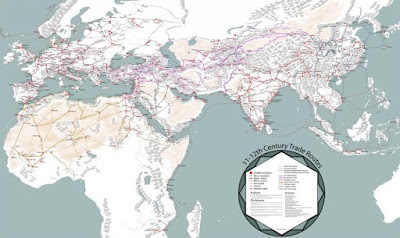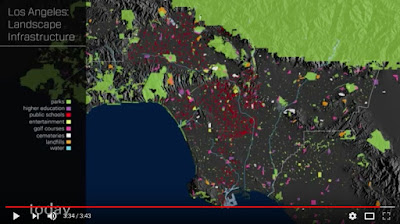
30 December 2019
Meet Markets ~ How Most of US Link Up ...
The Economist spotlights the changing Meet Markets, how people in America couple up... 

28 December 2019
World Population ~ Demographically Transitioning
The WEForum and Visual Capitalist share cool world population infographics from Our World in Data by economist Max Roser spotlighting how Longer lifespans are changing the shape of the world’s population pyramid... 





21 December 2019
Mapping Corruption ~ Transparency to Opacity
Visual Capitalist's Chart of the Week maps Transparency International 2018 data about corruption perceptions worldwide... 

13 December 2019
MIT Global Ventures ~ Emergent Newcos 2019!
Great to see all 29 final projects in our MIT Global+Development Ventures class this past Fall 2019, a joint-offering between MIT D-Lab, MIT Sloan School of Management, and MIT Media Arts & Sciences in the School of Architecture & Planning! My MIT Media Lab co-instructors Alex "Sandy" Pentland, Ramesh Raskar, and I are all keen to see where our students will take their projects next. Many have received MIT Sandbox support, others are Legatum Fellows or have Legatum Voyager grants over IAP/January 2020, most are entering MIT IDEAS and/or MIT $100K Entrepreneurship Competition Accelerate & Launch phases, and a few are engaging up-river in Harvard's President Innovation Challenge! And, of course, there's many more things to do beyond grant-seeking and contests, most especially actually founding, financing, and building these newcos! Here they are alphabetically...
- 1Room ~ Kenyan Affordable Personalized Learning System
- AiBaobao ~ Chinese Active Parenting Solutions
- Aqua ~ Argentinian Digital Banking
- AZEKI ~ African Designer Brand & Operational Solutions
- Co.Mig ~ Venezuelan Migrant Integration & Employment
- CON-DE ~ Architectural Material Reuse Solutions
- Corpus Law ~ Digital Accessible Legal Info
- CorruptionMonitor ~ Citizen Reporting Solutions
- Experimental Fund ~ Fast Harvard Student Project Funding
- Green Source ~ African Local Sustainble Fair Palm Oil
- GRIA ~ African Snack Foods
- IT VC for EAC ~ East African ICT Investment Fund
- KAAN ~ Latam Retired Expat Co-Living Communities
- Kinderoo ~ Affordable Distributed Day Care Services
- mBody ~ Pakistani Girls Body Literacy
- Medical Records ~ Ownership & Transportability
- Molo ~ Cote d'Ivoire Pay-as-you-go LPG
- MYLA ~ Make Your Life Awesome Virtual Personal Assistant
- Mylea ~ Sustainable Fashion Materials
- OneBeat ~ Social Exercise Engagement
- Pandar ~ African Smallholder Farmer Informatics
- RateMonk ~ Indian Online Academic Ratings & Informatics
- Red Feather ~ Canadian Indigenous Certification & Products
- RISE ~ Colombian Rural Innovations for Solidarity Economies
- Salut ~ Brazilian Integrated Healthcare Services
- TABIGO ~ Chinese Social Travel Planner
- Text4Health ~ Anonymous Sexual Health Services
- TOWARDS ~ Presentation Speech & Performance Coaching
- Wala ~ Ghanaian Blood Supply Solutions
09 December 2019
Trophic Cascade ~ Discovery & Eco-Regeneration
PBS Nature shares The Serengeti Rules episode on keystone species in ecosystems and the notion of a "trophic cascade" plus ultimately the prospect of ecosystem regeneration via "upgrading". These ecologists and natural scientists used "living labs" to better disentangle the complexities of biomes, for example, comparing tidepool life with and without starfish, pond life with and without bass fish, Scottish highlands with and without grazing sheep, parks with and without wolves, and kelp forests with and without sea otters. 

08 December 2019
Circular Economies ~ From Trashflow to Cashflow
I've become increasingly intrigued by the circular economies idea wherein the classic linear material and energy flows going from source-to-sink are supplanted by recycling or reuse or waste-use material flow loops. Sarah Murray makes The case for a circular world in the recent FT Special Report on the Circular Economy...

"This is an approach to industrial and consumption systems that shifts from linear “take-make-dispose” models to circular ones that return what comes from nature to the production cycle. This means going back to the drawing board. For example, Steelcase, the US office furniture maker, designs products with disassembly in mind. […] "we’re trying to, by design, keep things in the system as opposed to just reducing their negative impact,” […] For some companies, this has meant rethinking the business model. [Umcore made] the shift from mining operations to a business in refining, recycling and recovering speciality metals. […] DSM, a life sciences and materials sciences group [is] looking at how to recycle and reuse 100 per cent of carpets by making them from a single type of material, rather than from multiple materials. […] “People are frustrated by the extent of packaging and by having to throw a washing machine out after three years. Companies are responding —- that’s a big shift.”In the WEF report Towards the circular economy: Accelerating the scale-up across global supply they spotlight -- and illustrate -- the material flows of a restorative industry system...
"First, a circular economy aims to design out waste. [...] Second, circularity introduces a strict differentiation between consumable and durable components of a product. [...] Third, the energy required to fuel this cycle should be renewable by nature."

22 November 2019
Aridia ~ Towards Oasis Cities in the Drylands?
The WEF writes about Desertification: what is it and why is it one of the greatest threats of our time?
 In this light, it's worth inverting the issues and seeking opportunities in such drylands. The big technological achievements of the past half-century are solar power and desalination. But there's more, including much greater sophistication around water use, shades of greywater, cycling, and design and landscaping for water retention. Furthermore, reforestation, for instance in the Sahel, has been done with hardier plant varieties and is increasingly including soil modification or assistive techniques to both preserve water and make maximum use of every little bit. On arid but foggy coasts (e.g. Atacama, Namibia, etc) inexpensive materials are boosting the effectiveness of fog harvesting. And we can learn from classic desert cities and ancient techniques (e.g. Petra, the medinas, etc) about greening the desert. In any case, when you stitch all the existing and emergent ideas together, I believe there's a blossoming new category of "oasis cities" in arid regions.
In this light, it's worth inverting the issues and seeking opportunities in such drylands. The big technological achievements of the past half-century are solar power and desalination. But there's more, including much greater sophistication around water use, shades of greywater, cycling, and design and landscaping for water retention. Furthermore, reforestation, for instance in the Sahel, has been done with hardier plant varieties and is increasingly including soil modification or assistive techniques to both preserve water and make maximum use of every little bit. On arid but foggy coasts (e.g. Atacama, Namibia, etc) inexpensive materials are boosting the effectiveness of fog harvesting. And we can learn from classic desert cities and ancient techniques (e.g. Petra, the medinas, etc) about greening the desert. In any case, when you stitch all the existing and emergent ideas together, I believe there's a blossoming new category of "oasis cities" in arid regions.
"The combined impact of climate change, land mismanagement and unsustainable freshwater use has seen the world’s water-scarce regions increasingly degraded. This leaves their soils less able to support crops, livestock and wildlife. This week, the Intergovernmental Panel on Climate Change (IPCC) will publish its special report on climate change and land. The report, written by hundreds of scientists and researchers from across the world, dedicates one of its seven chapters solely to the issue of desertification."The 30 year climate map illustrates the geographies involved (plus see also Koppen climate maps)...
 In this light, it's worth inverting the issues and seeking opportunities in such drylands. The big technological achievements of the past half-century are solar power and desalination. But there's more, including much greater sophistication around water use, shades of greywater, cycling, and design and landscaping for water retention. Furthermore, reforestation, for instance in the Sahel, has been done with hardier plant varieties and is increasingly including soil modification or assistive techniques to both preserve water and make maximum use of every little bit. On arid but foggy coasts (e.g. Atacama, Namibia, etc) inexpensive materials are boosting the effectiveness of fog harvesting. And we can learn from classic desert cities and ancient techniques (e.g. Petra, the medinas, etc) about greening the desert. In any case, when you stitch all the existing and emergent ideas together, I believe there's a blossoming new category of "oasis cities" in arid regions.
In this light, it's worth inverting the issues and seeking opportunities in such drylands. The big technological achievements of the past half-century are solar power and desalination. But there's more, including much greater sophistication around water use, shades of greywater, cycling, and design and landscaping for water retention. Furthermore, reforestation, for instance in the Sahel, has been done with hardier plant varieties and is increasingly including soil modification or assistive techniques to both preserve water and make maximum use of every little bit. On arid but foggy coasts (e.g. Atacama, Namibia, etc) inexpensive materials are boosting the effectiveness of fog harvesting. And we can learn from classic desert cities and ancient techniques (e.g. Petra, the medinas, etc) about greening the desert. In any case, when you stitch all the existing and emergent ideas together, I believe there's a blossoming new category of "oasis cities" in arid regions.
04 November 2019
Desalination Brine ~ Side Effect or Opportunity?
The BBC spotlights Concerns over increase in toxic brine from desalination plants...

"Desalination plants around the world are pumping out far more salt laden brine than previously believed [...] The salty effluent is a by-product of efforts to extract fresh water from the sea. [...] The brine raises the level of salinity and poses a major risk to ocean life and marine ecosystems. [...] There's been a major expansion of desalination plants around the world over the past few years, with almost 16,000 now operating in 177 countries. It's estimated that these plants produce 95 million cubic metres of freshwater per day from seas and rivers -- equivalent to almost half the average flow over Niagara Falls. But the success of the technology is coming at a price. This new study estimates these plants discharge 142 million cubic metres of extremely salty brine every day, a 50% increase on previous estimates."All challenging and yet therein also lies opportunities, including the mining and refinement of salts, minerals, and metals.

15 September 2019
Unicorns ~ Mapping Emergent Gigaventures...
The WEForum spotlights Visual Capitalist's latest Chart of the Week looking at the Unicorn Landscape in 2019... 

31 August 2019
Sci Fab ~ Envisioneer & Futurecraft ~ Fall 2019
My MIT Media Lab colleagues Dan Novy, Joe Paradiso and I are (finally) re-offering our Sci Fab class this Fall 2019 starting Monday night September 9th from 7-10pm!
In Sci Fab, we read and watch science fiction, and use the inspiration it provides to envisioneer and futurecraft something epic. First, we explore worldbuilding -- imagining science fictional universes across domains and scales. Second, we focus on exemplar artifacts that iconify those worlds, without violating the laws of physics, and iterate towards functional prototypes.
In Sci Fab, we read and watch science fiction, and use the inspiration it provides to envisioneer and futurecraft something epic. First, we explore worldbuilding -- imagining science fictional universes across domains and scales. Second, we focus on exemplar artifacts that iconify those worlds, without violating the laws of physics, and iterate towards functional prototypes.
Remittance Flows ~ FT Infographic on Pathways
The FT writes about Remittances: the hidden engine of globalisation...
"The number of people in the world who live outside the country of their birth has risen from 153m in 1990 to 270m last year according to the World Bank, swelling global remittance payments from a trickle to a flood. As migration has increased, these financial snail-trails have become one of the defining trends of the past quarter-century of globalisation -- the private, informal, personal face of global capital flows. For many developing economies, it is a lifeline. [...] Some governments have sought to channel remittances into development efforts; Indonesia is the latest country to consider a “diaspora bond” in a bid to tap the savings of its wealthier overseas residents."
28 August 2019
Global Ventures ~ Inclusive Prosperity ~ Fall 2019
My MIT Media Lab colleagues Alex (Sandy) Pentland, Ramesh Raskar and I -- together with instructor colleagues Beth Porter, David Shrier, Indu Kodukula, Thomas Hardjono, and Nathan Eagle -- are co-hosting an upgraded incarnation of our Global Ventures class this Fall 2019 at the Media Lab top-floor E14-633 starting Thursday afternoon September 5th from 10am-12noon.
Also known as Development Ventures, this class has been offered since 2001 and is part of the D-Lab family. GV seeks scalable solutions & exponential innovations for emerging markets and underserved communities anywhere. This class is about planning ventures which deploy solutions reaching as many people as possible with positive impact and maximizing progress towards inclusive prosperity. The most promising class projects have formed the basis for real ventures, including such alumcos as MAX, Sanergy, Wecyclers, Jamii, PEN, WAY, MDaaS, and dozens more. Those interested are invited to join us at our kickoff class session on 9/5/2019!
Also known as Development Ventures, this class has been offered since 2001 and is part of the D-Lab family. GV seeks scalable solutions & exponential innovations for emerging markets and underserved communities anywhere. This class is about planning ventures which deploy solutions reaching as many people as possible with positive impact and maximizing progress towards inclusive prosperity. The most promising class projects have formed the basis for real ventures, including such alumcos as MAX, Sanergy, Wecyclers, Jamii, PEN, WAY, MDaaS, and dozens more. Those interested are invited to join us at our kickoff class session on 9/5/2019!
27 August 2019
Revolutionary Ventures ~ Bold Ideas ~ Fall 2019
My MIT Media Lab colleagues Ed Boyden, Joe Jacobson and I are co-hosting the latest version of our Revolutionary Ventures class this Fall 2019 in a new bigger classroom at the Media Lab -- top-floor E14-633 -- starting Thursday afternoon September 5th from 2-4pm.
This offering is the closest MIT comes to having an "Institute-Wide Elective" and is listed in four of our five Schools. Revolutionary Ventures is a project-oriented Action Lab course on envisioning and building ideas and organizations to initiate and/or accelerate engineering revolutions. The overall course focuses on emerging technology domains -- such as synthetic biology, materials, energy, neurotechnology, imaging, AI / machine learning, gerontechnology, and bio-and-nano fabrication -- and their commercialization. The most promising class projects have formed the basis for real ventures, including such alumcos as Elektra, Hive, C16 Bio, Leeruniek, BioBright, and more. Those interested are invited to join us at our kickoff class session on 9/5/2019!
This offering is the closest MIT comes to having an "Institute-Wide Elective" and is listed in four of our five Schools. Revolutionary Ventures is a project-oriented Action Lab course on envisioning and building ideas and organizations to initiate and/or accelerate engineering revolutions. The overall course focuses on emerging technology domains -- such as synthetic biology, materials, energy, neurotechnology, imaging, AI / machine learning, gerontechnology, and bio-and-nano fabrication -- and their commercialization. The most promising class projects have formed the basis for real ventures, including such alumcos as Elektra, Hive, C16 Bio, Leeruniek, BioBright, and more. Those interested are invited to join us at our kickoff class session on 9/5/2019!
24 August 2019
Unfree Speech ~ Economist on Censorship Rise
The Economist spotlights the Change in Freedom of Expression... 

GB, UK Explained ~ CGP Grey's Crown Venn...
CGPGrey explains The Difference between the United Kingdom, Great Britain and England...
And yes, I did post this same thing six years ago. I both forgot and still think this kind of Venn viewing is incredibly useful!-)
And yes, I did post this same thing six years ago. I both forgot and still think this kind of Venn viewing is incredibly useful!-)
13 August 2019
Global Forestation ~ Changes over Time...
BBC Reality Check's Jack Goodman asks Deforestation: What’s wrong with planting new forests? 

30 July 2019
Margaret by Moonlight ~ Making Mirrors Display!
Epic homage to Apollo software engineer Margaret Hamilton!
21 July 2019
Creative Class Growth ~ Mapping Rise of Rest...
Richard Florida writes in CityLab that Maps Reveal Where the Creative Class Is Growing in the US...


"A growing chorus of economists and urbanists suggest that we may be seeing the “rise of the rest,” a result of both increasingly unaffordable housing in established hubs and the improvement of the economies in less-established hubs. [...] The map shows the percentage growth in the creative class from 2005 to 2017. A number of Rustbelt and Sunbelt metros which have previously lagged now show robust growth. Salt Lake City posted the fastest growth, with Pittsburgh and Cincinnati next in line. Las Vegas, which had the smallest creative class share of large metros in 2005, also saw significant growth. Of leading creative class metros, only Seattle and Baltimore registered comparable gains. [...] The even better news is that the creative class -- which often garners the highest paying jobs -- appears to be growing as a percentage of total workforce employment across the board."


06 July 2019
Ike's Road Trip ~ 1919's American Expedition!
Today is the centennial of the start of America's "worst but most important" road-trip! Engineering News-Record writes Eisenhower's 1919 Trip Helped Pave Way for the Interstate and shares archival footage showing the...
"Grueling 1919 trek [which] helped shape then-Army officer Eisenhower’s later views that played a part in launching the Interstate system during his presidency."
Connected World ~ International Collaborations
Nature shares Connected World infographic spotlighting patterns of international collaborations from 1 February 2018 to 30 January 2019 as captured by the Nature Index... 

04 July 2019
Liberty ~ Increasingly AWOL from US... WTF!

As this amazing country celebrates its birth -- an epic achievement made possible ~230 years ago by righteous, civic-minded, and wise men who despised and indeed fought the grotesque evil, "political correctness", and geopolitical stupidity of their day -- let's think earnestly about the subsequent violations of the US Constitution and seemingly neverending erosion of and painful decimation of hard-won liberties, including...
- Gerrymandering and Illegitimate Non-Representation
- Illegitimate Warfare, Invasions, and Offensive Actions
- Unwarranted Searches and Seizures in both Physical and Digital Realms
- Unfunded Mandates, Conscription, and Similar Unconstitutional Equivalents to Slavery
- Taxation without Proper Representation or Proportionality including Rapacious Income and Wealth Taxation
- Criminalization of Victimless Vices including Drug Use, Prostitution, Gambling, etc
- Unequal Treatment of Voting Age Citizens via Drinking, Smoking, Driving, and other Illegitimate Age-based Discriminatory Laws
- Myriad Unconstitutional Impositions upon peoples Freedoms of Religion, Speech, Commerce, Migration, and Choice
- An enormous Governmental Bloatocracy, endless Illegitimate Entitlements, and increasingly Outrageous Debt
- Absence of Reason, Facts, Evidence, Logic, and Thought in far too much of what the Government does
28 June 2019
Women in Space ~ Astronautical Advantages...
Nadia Drake in NatGeo writes Here’s why women may be the best suited for spaceflight...

"Physically and mentally, women have the right stuff for lengthy missions in space. So why send men when you can send just their contributions to the next generation, collected and cryopreserved in tiny vials? Sending an all-female crew and a sperm bank lets a space program economize while also increasing the genetic diversity of the parental pool."

10 June 2019
01 June 2019
PV Potential ~ Mapping Sunpower Worldwide...
The Sun is a giant thermonuclear reactor in the sky powerbeaming 24x7. A tiny sliver hits the daily rotating Earth and then you have to discount for angles and overcasts. When all's accounted for, here's the resulting worldmap of terrestrial potential for PV or photovoltaic sunpower...  Curiously enough, most maps like this only show land incidence. But surely we could float massive solar panels out on swathes of ocean? In fact, perhaps we should hoover up the massive ocean gyres of waste plastic and convert these into floatation for PV paneling.
Curiously enough, most maps like this only show land incidence. But surely we could float massive solar panels out on swathes of ocean? In fact, perhaps we should hoover up the massive ocean gyres of waste plastic and convert these into floatation for PV paneling.
 Curiously enough, most maps like this only show land incidence. But surely we could float massive solar panels out on swathes of ocean? In fact, perhaps we should hoover up the massive ocean gyres of waste plastic and convert these into floatation for PV paneling.
Curiously enough, most maps like this only show land incidence. But surely we could float massive solar panels out on swathes of ocean? In fact, perhaps we should hoover up the massive ocean gyres of waste plastic and convert these into floatation for PV paneling.
27 May 2019
Protected Planet ~ Goal of 50% of Earth by 2050
I'm particularly interested in seeing half of Earth be protected by 2050. Towards this goal, Protected Planet shares the World Database on Protected Areas (WDPA) covering both terrestrial and marine protected areas and tracks progress...  The IUCN has a half dozen so-called "Protected Area Management Categories" -- and those are important and worth adding to directly, but I hope we can especially push for enhancement of Category VI "Sustainable Use" with particular eye on private conservancies, land banks, forestry reserves, flood management zones, and potentially even the careful extractions of natural resources. Finally, I hope that we figure out how not to ravage the other half of Earth but rather we green it appropriately (e.g. our cities), share it with nature, and refrain from eco-devastation generally.
The IUCN has a half dozen so-called "Protected Area Management Categories" -- and those are important and worth adding to directly, but I hope we can especially push for enhancement of Category VI "Sustainable Use" with particular eye on private conservancies, land banks, forestry reserves, flood management zones, and potentially even the careful extractions of natural resources. Finally, I hope that we figure out how not to ravage the other half of Earth but rather we green it appropriately (e.g. our cities), share it with nature, and refrain from eco-devastation generally.
 The IUCN has a half dozen so-called "Protected Area Management Categories" -- and those are important and worth adding to directly, but I hope we can especially push for enhancement of Category VI "Sustainable Use" with particular eye on private conservancies, land banks, forestry reserves, flood management zones, and potentially even the careful extractions of natural resources. Finally, I hope that we figure out how not to ravage the other half of Earth but rather we green it appropriately (e.g. our cities), share it with nature, and refrain from eco-devastation generally.
The IUCN has a half dozen so-called "Protected Area Management Categories" -- and those are important and worth adding to directly, but I hope we can especially push for enhancement of Category VI "Sustainable Use" with particular eye on private conservancies, land banks, forestry reserves, flood management zones, and potentially even the careful extractions of natural resources. Finally, I hope that we figure out how not to ravage the other half of Earth but rather we green it appropriately (e.g. our cities), share it with nature, and refrain from eco-devastation generally.
Personal Electric Mobility ~ Market Size & Share
Very interesting to see adoption of personal electric vehicles in Europe and Asia. Curious how much of the advantages are State subsidy and tax relief? Norway, for example, offers substantial tax benefits, the right to drive in carpool lanes solo, and free charging, which kind of distorts market action. Also, China has endless ways of State subsidies for both personal and mass transit electrification. Which all may make environmental sense. In any case, here's share and size info from Statista... 

01 April 2019
31 March 2019
Doing Business ~ Global Ease Rankings Map...
Visual Capitalist helps us understand which countries support entrepreneurship and business and which do not, much to the suffering of their peoples... 

EARTH ~ All of Humanity on One Chart...
Visual Capitalist helps us visualize where people live? Roughly 1/5 in each of Eurasian-Americas, Africa, Rest-of-Asia, Tjina, and Hindia. Or on EARTH for short... 

30 March 2019
14 March 2019
Tectonics in the Tropics ~ Ice Age Triggers!
Jennifer Chu of MIT News spotlights recent research indicating that Tectonics in the Tropics Trigger Earth’s Ice Ages...

"Over the last 540 million years, the Earth has weathered three major ice ages [each] preceded by tropical “arc-continent collisions” -- tectonic pileups that occurred near the Earth’s equator -- in which oceanic plates rode up over continental plates, exposing tens of thousands of kilometers of oceanic rock to a tropical environment. [The] heat and humidity of the tropics likely triggered a chemical reaction between […] the rocks’ calcium and magnesium […] pulling the [CO2] out of the atmosphere and permanently sequestering it in the form of carbonates such as limestone [cooling] temperatures globally and ultimately [setting] off an ice age."

Beyond the Cradle ~ Media Lab x Outer Space!
Excellent to see the third year of Beyond the Cradle organized by the Space Exploration Initiative at MIT Media Lab today! Great talk by Nobel physicist Prof Sam Ting this morning plus SF panel featuring Daniel Suarez (of Daemon, FreedomTM, and Influx fame, with Delta-v coming soon!) among others! See live video!
23 February 2019
US Employment ~ Visualizing Changes over Time
Visual Capitalist shares US Employment History and changes afoot... 

19 February 2019
Civilizational Endurance ~ Causes of Collapse...
Luke Kemp at the BBC asks Are we on the road to civilisation collapse?
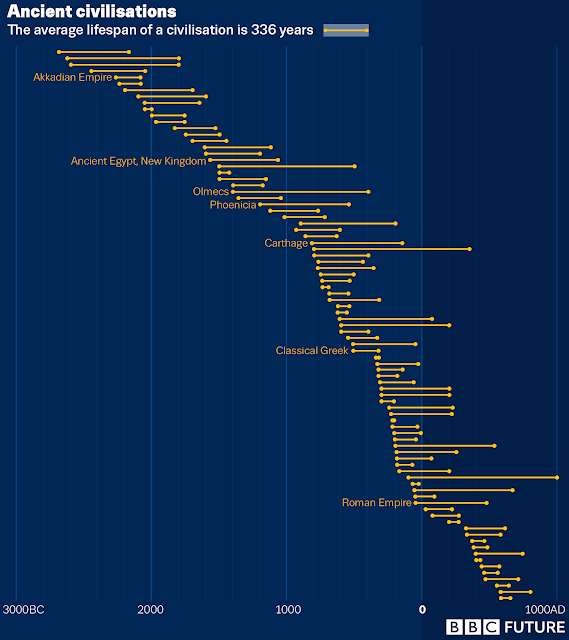
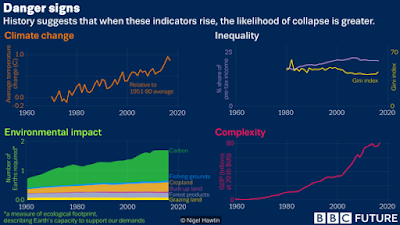
"If the fate of previous civilisations can be a roadmap to our future, what does it say? One method is to examine the trends that preceded historic collapses and see how they are unfolding today. [...] The collapse of our civilisation is not inevitable. History suggests it is likely, but we have the unique advantage of being able to learn from the wreckages of societies past. [...] We will only march into collapse if we advance blindly. We are only doomed if we are unwilling to listen to the past."

"Collapse is a tipping point phenomena, when compounding stressors overrun societal coping capacity. We can examine these indicators of danger to see if our chance of collapse is falling or rising. Here are four of those possible metrics, measured over the past few decades:"

18 February 2019
Marine Protected Areas ~ Conserving the Seas
The BBC's Ade Adepitan visits the coast of Gabon which has implemented a substantial Marine Protected Area off its coast. I've been moved by the idea that half of Earth should be set aside in nature protection reserves. That is, half for animal kingdom, half for humanity. Right now, there's a lot more work to be done. Here's the biggest of the MPA's... 

09 February 2019
AI for Impact ~ Spring'19 @ MIT Media Lab...
Together with colleague Ramesh Raskar, I'm co-teaching the AI for Impact seminar this Spring 2019 every Mon afternoon starting Feb 11th from 2:30-4:30a in E15-341, the heart of the MIT Media Lab! Our goal is to bring computational, analytics, and AI techniques to bear on solving problems in the high impact realms of health & wellness, cities & sustainability, across scales of action from each of us as individuals to embracing all of humanity, in both developed and emerging markets alike, all broadly understood. We want to help students identify top AI opportunities for impact and help make progress towards building prototypes, planning action ventures, and/or better understanding the emerging technology and impact trendscape. Formerly known as "Imaging Ventures" or “AI Ventures”, this “AI for Impact” class seeks answers to the question: If you could make almost anything, what's actually most worth making, i.e. what problems are most worth picking? We believe starting with the right problem is 90% of what makes for great projects and ultimately epic, worthy solutions.
Labels:
2019,
AI,
Engineering,
Envisioning,
Impact,
Media,
Media Lab,
MIT,
Ventures
05 February 2019
Inclusive Economies ~ Spring'19 D-Lab Seminar
Together with colleagues Kate Mytty and Libby McDonald, I'm co-teaching the Inclusive Economies seminar this Spring 2019 every Wed morning starting Feb 6th from 9:30-11:30a in N51-350, the D-Lab classroom area! We explore how innovations and market mechanisms can benefit humanity by rallying impact investments, engaging participants cooperatively, boosting equity and resilience, and broadening prosperity. We look at market mechanisms for maximizing participation, choice, and growth; impact investing approaches which are socially responsible and include metrics that matter; cooperative and mutual ownership structures for shared gains; equitable citizen participation in basic and natural resource wealth; and the role of new technologies and methods towards boosting affordability, accessibility, and overall inclusive prosperity. 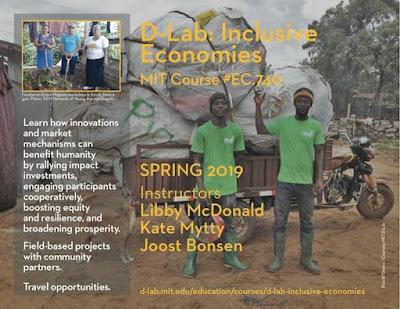

25 January 2019
Hurricane Prediction ~ Forecast Quality Progress
Richard B. Alley, Kerry A. Emanuel, Fuqing Zhang write in Science about Advances in weather prediction...
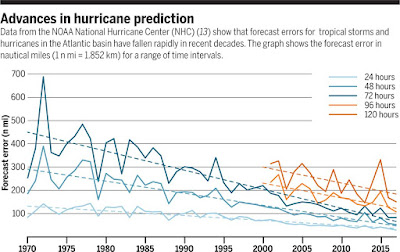
"In recent decades, advances in forecasting have been rapid, arising from improved observations and models, and better integration of these through data assimilation and related techniques. Investment in weather forecasting pays large dividends, ranging from 3 to 10 times the costs. [But] the developing world is especially vulnerable to weather disasters yet is underserved by forecasting."

14 January 2019
Greening the Desert ~ Alt Perspectives...
Three documentary examples of rehabilitating large-scale damaged ecosystems...
09 January 2019
Disaffection with Democracy ~ Warning Signs...
Roberto Stefan Foa and Yascha Mounk in The Signs of Deconsolidation in the Journal of Democracy share evidence of a global pattern of disaffection with democratic systems...
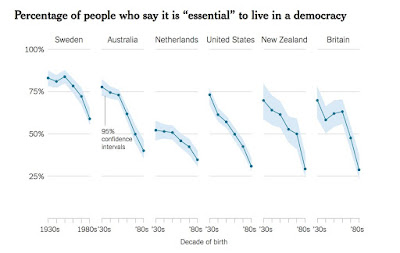
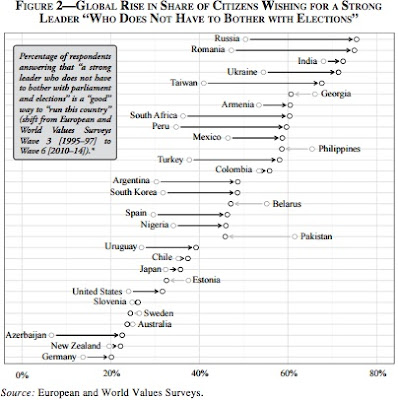
"Americans’ dissatisfaction with the democratic system is part of a much larger global pattern. It is not just that the proportion of Americans who state that it is “essential” to live in a democracy, which stands at 72 percent among those born before World War II, has fallen to 30 percent among millennials. It is also that [...] a similar cohort pattern is found across all longstanding democracies, including Great Britain, the Netherlands, Sweden, Australia, and New Zealand. In virtually all cases, the generation gap is striking, with the proportion of younger citizens who believe it is essential to live in a democracy falling to a minority."

"What is more, this disaffection with the democratic form of government is accompanied by a wider skepticism toward liberal institutions. Citizens are growing more disaffected with established political parties, representative institutions, and minority rights. Tellingly, they are also increasingly open to authoritarian interpretations of democracy. The share of citizens who approve of “having a strong leader who does not have to bother with parliament or elections,” for example, has gone up markedly in most of the countries where the World Values Survey asked the question -- including such varied places as Germany, the United States, Spain, Turkey, and Russia"

08 January 2019
LA Timelapse Map ~ Infra, Nets, Pop, Econ, etc!
Human Life Indicator (HLI) ~ Alt-Index to HDI...
WEForum shares the Human Life Indicator (HLI) proposed by Sergei Scherbov, Simone Ghislandi, and Warren Sanderson as an alternative measure of development solving several problems of the Human Development Index (HDI)...
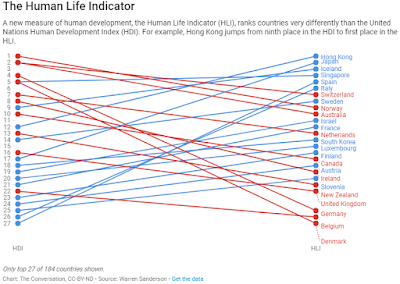

"The HDI is like a country’s report card. In a single number, it tells policymakers and citizens how well a country is doing. The HDI has been wildly successful in changing the way people think about the development process. However, it still suffers from real flaws. First, it implicitly assumes trade-offs between its components. The HDI also struggles with the accuracy and meaningfulness of the underlying data. Finally, data on different domains may be highly correlated. The HLI looks at life expectancy at birth, but also takes the inequality in longevity into account. If two countries had the same life expectancy, the country with the higher rate of infant and child deaths would have a lower HLI."


Manhattan's Densities ~ Rise & Fall 1800-2010
Nice timelapse animation of Manhattan's Densities changing over two centuries based on data collected by Shlomo Angel and Patrick Lamson-Hall of the NYU Stern Urbanization Project! 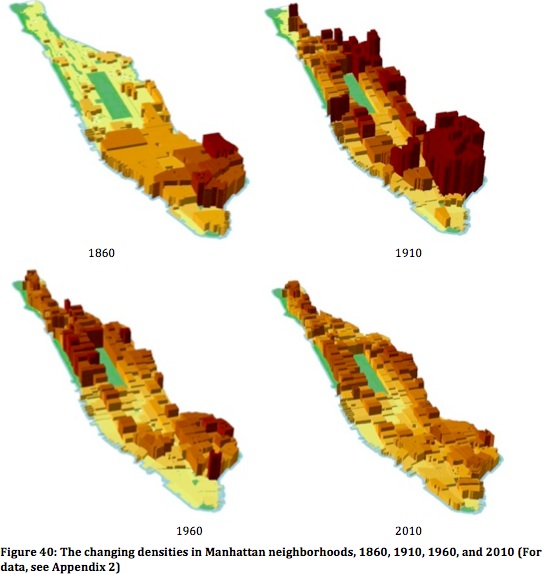

06 January 2019
Sugi Circles ~ Japanese Tree Spacing Test
Japan’s Ministry of Agriculture, Forestry and Fisheries in 1973 engaged in... 
“experimental forestry” and one of the experiments was to try and measure the effect of tree spacing on growth. The experiment was carried out by planting sugi (Japanese cedar) trees in 10 degree radial increments forming 10 concentric circles of varying diameters."

04 January 2019
03 January 2019
Global Growth Rates ~ GDP Forecasts 2019...
The Economist forecasts GDP worldwide in 2019... 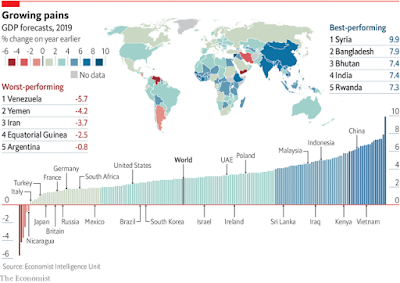

Subscribe to:
Posts (Atom)










